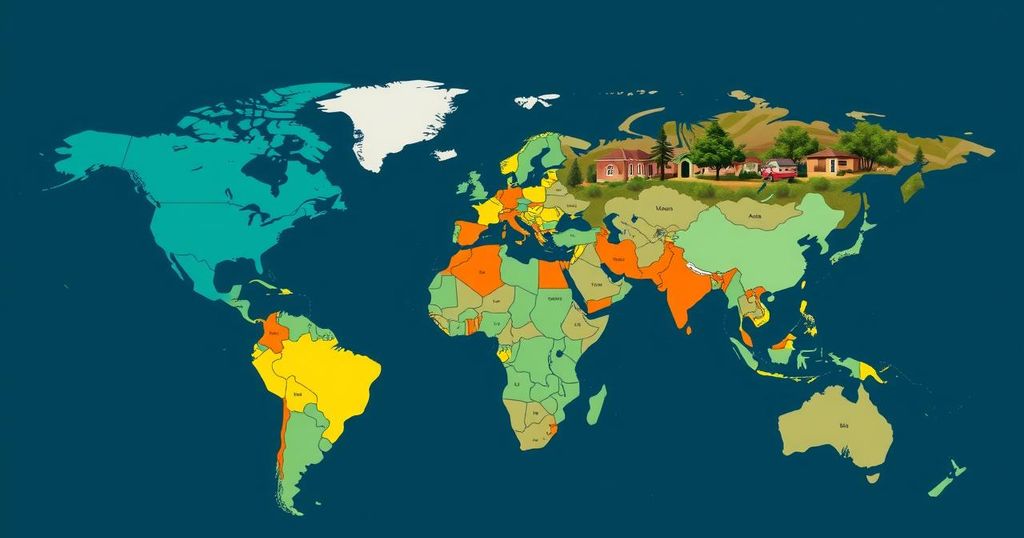Wealthier Nations Begin Compensating Poorer Countries for Climate Devastation

Wealthier countries are beginning to financially assist poorer nations affected by climate change through loss and damage compensation. This new funding model aims to assist those most affected, such as families in Malawi devastated by Cyclone Freddy. While initial pledges have been made, experts warn that the amount is inadequate for future needs, highlighting urgent negotiations for sustainable funding solutions at COP29.
As the repercussions of climate change intensify, wealthier countries are beginning to provide financial compensation to poorer nations suffering from its devastating effects. Cyclone Freddy, which struck southern Malawi in 2023, exemplifies this crisis. The cyclone resulted in catastrophic flooding, displacing vast numbers of families, including that of Christopher Bingala, a subsistence farmer, who received a crucial $750 payment. This compensation ultimately enabled him to rebuild his home after losing everything to the storm.
This funding, termed “loss and damage” compensation, is a response to the increasing frequency and severity of climate-related disasters disproportionately affecting low-income countries, which contribute minimally to global emissions. In 2022, wealthier nations pledged creating a fund specifically to address these damages, totaling approximately $720 million pledged from entities such as the European Union and the United States. However, experts caution that this sum is insufficient given the escalating climate crisis and may fall short of addressing emerging needs.
During the ongoing COP29 climate summit in Baku, Azerbaijan, discussions are centering around compensation owed to these developing nations as part of a broader climate finance strategy that encompasses loans and investments. Furthermore, significant challenges persist in delivering compensation, as exemplified by the aftermath of Cyclone Freddy, which displaced approximately 650,000 individuals in Malawi alone.
Bingala’s narrative highlights not just a significant moment of recovery but illustrates a broader necessity for effective climate finance systems. The funds, distributed by GiveDirectly—an organization dedicated to providing unconditional cash transfers—are vital for families who lack financial protections or insurance against these disasters. Most assistance has yet to be disbursed, with details regarding eligibility and allocation still under discussion. Low-income countries advocate that the funding could be utilized for broader reclamation initiatives, which would include relocating populations and safeguarding vital cultural and ecological resources.
The demand for loss and damage compensation is anticipated to escalate dramatically, reaching an estimated $250 billion each year by 2030. Philip Davis, Prime Minister of the Bahamas, expressed urgency in this matter, indicating that his nation’s substantial national debt exacerbated by disasters necessitates urgent action and funding, lest they incur dire humanitarian crises and forced displacements due to climate upheavals.
The movement towards equitable climate finance signifies a crucial turning point in global climate policy, urging accountable participation from developed nations in addressing the destructive impacts of climate change.
The sentiments articulated by leaders such as Prime Minister Davis imply a pressing call to action: failure to take responsibility will ultimately place developed nations in jeopardy when the repercussions of climate change cross borders and lead to profound regional destabilization.
This case underscores the pressing necessity for cohesive international cooperation and commitment to secure comprehensive funding solutions to counter the arising climate challenges confronting our planet.
The phenomenon of climate change disproportionately impacts low-income countries, which contribute minimally to greenhouse gas emissions yet experience the most severe consequences of environmental disasters, including floods, droughts, and storms. The concept of “loss and damage” compensation has emerged as a crucial funding strategy aimed at assisting these nations in recovering from the adverse effects of climate change. Following significant climate events like Cyclone Freddy, there has been an increasing responsibility recognized among wealthier countries to financially support these vulnerable communities. The initiative to create a dedicated fund for loss and damage compensation marked a pivotal moment in international climate negotiations, reflecting a growing recognition of the need for equitable climate finance across nations.
The establishment of loss and damage compensation represents a significant stride in addressing the inequities caused by climate change. While initial funding commitments have been made, immediate actionable frameworks are needed to ensure that these resources effectively reach vulnerable populations. Continued discussions and negotiations at international levels, particularly at forums like COP29, emphasize the urgency for developed nations to contribute genuinely to mitigating the impacts of climate change. The responsibility to assist developing countries transcends mere fiscal obligations; it embodies a necessary moral imperative to confront the shared global challenge of climate change.
Original Source: www.wmuk.org






